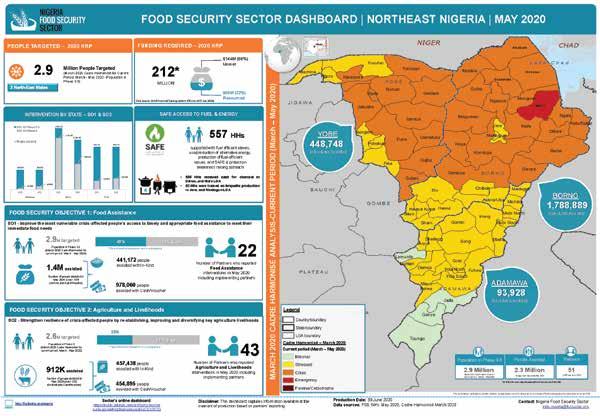
2 minute read
Food Security Sector
iMMAP has been providing information management support to the Food Security
Sector (FSS) since 2017. iMMAP’s support over the past year has involved meeting
the sector’s IM needs in data management (data collection, validation, cleaning,
and analysis), partner capacity development, coordination with OCHA on the
development of the HNO and HRP, and the Global Food Security Cluster (gFSC) for
country updates, working group membership, data updates, partner and donor
engagement (provision of project-specific information and analysis, data request),
and inter-sectoral and working group engagement.
This has enabled the sector to publish monthly and quarterly information
management products such as the Famine Early Warning Systems Network
(FEWSNET) summary, 5W reports to OCHA, cash dashboards, sectoral dashboards,
partner presence mapping, Gap Analysis for Strategic Objective I and II, and the
Partner Intervention Plan. As of June 2020, the FSS and its 52 partners have been
able to provide food assistance to 1.9 million beneficiaries and supported 1 million
beneficiaries with agricultural and livelihoods interventions across 65 local
government areas in Borno, Adamawa and Yobe States.
The IM products developed by iMMAP’s IMO supporting the FSS are often used
within and outside the sector to promote evidence-based planning, decision-mak-
ing, and inter-sectoral coordination. The IMO also facilitated sector training while
co-authoring the FSS’s information management and reporting training resources.
Furthermore, submission of response data to OCHA for the online Response
Planning and Monitoring (RPM) was conducted regularly.
In response to the current COVID-19 pandemic, the sector gathered data from
partners and secondary sources to update the current June Cadre Harmonisé (CH),
which put the number of people in need at 4.3 million from 2.9 million, identifying
an additional 1.4 million people in need due to COVID-19. The HRP addendum budget has taken these vulnerable individuals and communities into account.
The sector IMO has also been actively contributing to the FSS team to set up
guidelines for the COVID-19 response for FSS partners based on guidance from
the gFSC. This includes establishing a COVID-19 task force on the various
sub-sectors under FSS such as Food Assistance, Remote Monitoring, and
Agriculture and Livelihoods. As a key member of the task force, the sector IMO
has been working with partners to provide them with regular response updates
while coordinating with other sectors, for example, to link FSS partners with the
Nutrition and WASH Sectors to improve coordination in the response activities
to camps during the pandemic.
iMMAP’s support also enabled the sector to maintain regular updates of partner
operational presence tracking and mapping, food assistance response and gap
analysis, update to the food security and cash dashboards, ad-hoc analysis
requests, donor updates, and information support.
Evidence-based and data-driven decisions will lead to better outcomes for IDPs,
returnees, and food insecure populations across northeast Nigeria. The
information management support has also helped to prevent duplication of
efforts and geographical inequities in the distribution of interventions.









